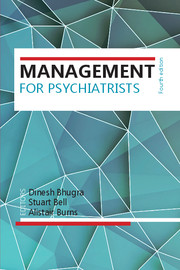Book contents
- Frontmatter
- Contents
- List of contributors
- List of figures, tables and boxes
- Preface
- Part I Theoretical overview
- Part II Changes and conflicts
- 11 Medical leadership skills: what is needed to be a successful leader?
- 12 Understanding systems
- 13 Working with the team
- 14 Managing multicultural and multinational teams in healthcare
- 15 Management of change
- 16 Managing the psychiatrist's performance
- 17 Revalidation for psychiatrists
- 18 Quality improvement tools
- 19 Quality and quality governance
- 20 Measurement of needs
- 21 Service users’ expectations
- 22 Clinical audit
- 23 Confidentiality and management in healthcare organisations
- 24 Patient complaints: every doctor's business
- 25 Mental health review tribunals. Or, tribunals, and how to survive them
- Part III Personal development
- Index
22 - Clinical audit
from Part II - Changes and conflicts
Published online by Cambridge University Press: 02 January 2018
- Frontmatter
- Contents
- List of contributors
- List of figures, tables and boxes
- Preface
- Part I Theoretical overview
- Part II Changes and conflicts
- 11 Medical leadership skills: what is needed to be a successful leader?
- 12 Understanding systems
- 13 Working with the team
- 14 Managing multicultural and multinational teams in healthcare
- 15 Management of change
- 16 Managing the psychiatrist's performance
- 17 Revalidation for psychiatrists
- 18 Quality improvement tools
- 19 Quality and quality governance
- 20 Measurement of needs
- 21 Service users’ expectations
- 22 Clinical audit
- 23 Confidentiality and management in healthcare organisations
- 24 Patient complaints: every doctor's business
- 25 Mental health review tribunals. Or, tribunals, and how to survive them
- Part III Personal development
- Index
Summary
Clinical audit is a central component of clinical governance and is the principal tool for providers and patients to find out if healthcare is being delivered to the required standard and continuously improves. It is defined by the National Institute for Health and Care Excellence (NICE) as:
‘a quality improvement process that seeks to improve patient care and outcomes through systematic review of care against explicit criteria and the implementation of change. Aspects of the structure, processes, and outcomes of care are selected and systematically evaluated against explicit criteria. Where indicated, changes are implemented at an individual, team, or service level and further monitoring is used to confirm improvement in healthcare delivery.’ (NICE, 2002)
Participation in clinical audit by hospital doctors was made mandatory with the publication of A First Class Service (Department of Health, 1998) and is a requirement of Good Psychiatric Practice (Royal College of Psychiatrists, 2009). Psychiatrists should ‘participate in clinical audit to measure and improve clinical care provided by themselves and their team’. It is a prerequisite for revalidation (General Medical Council, 2012). Done well, it can lead to significant and sustained improvement in outcomes for users but at its worst it can be a time-consuming, demoralising waste, with no clear benefits, while diverting precious clinical time away from patients. The report of the public inquiry into Mid Staffordshire NHS Foundation Trust (Francis, 2013) marked a sentinel moment in quality improvement with a demand to put the quality of patient care, and especially patient safety, above all other aims; it reaffirmed the primacy of clinical audit in this process. Don Berwick asserted that mastery of quality and patient safety science and practices should be part of the initial preparation and lifelong education of not only healthcare professionals but also managers and executives (National Advisory Group on the Safety of Patients in England, 2013). He went on to highlight the ‘most single important change’ in the NHS would be for it to become ‘a system devoted to continual learning and improvement of patient care, top to bottom and end to end’.
- Type
- Chapter
- Information
- Management for Psychiatrists , pp. 323 - 331Publisher: Royal College of PsychiatristsPrint publication year: 2016



